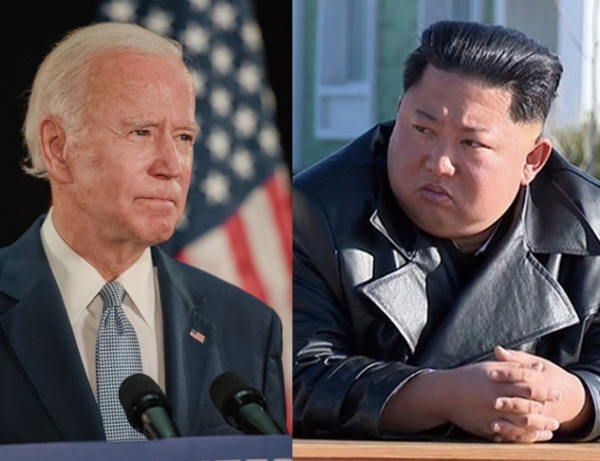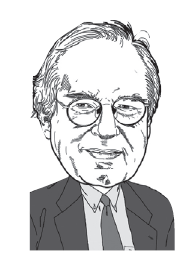
보수성향의 도널드 트럼프를 계승해 진보성향의 조 바이든이 당선된 것은 북한 김정은이 인정하지 않으려는 코로나와 자국민들 사이에서 굶주림과 빈곤을 퇴치해야 하는 김정은에게는 최악의 순간이다.
김정은이 실망한 나머지 더 많은 미사일 발사로 바이든의 승리를 맞이할 것인가를 고민하지만 트럼프 대통령이 세 차례 회담 중 김정은과 ‘사랑에 빠져’ 행동한 반면 바이든은 그의 뜻이 아니라 천천히 접근방법을 추구하는 전문가 참모들의 조언을 구할 것으로 보인다.
바이든 당선인의 승리는 트럼프 대통령이 미국의 동맹국인 영국부터 한국, 일본에 이르기까지 돈과 기여할 것을 더 많이 요구하며 경멸해온 동맹관계를 적극적으로 지지하겠다는 뜻이다. 트럼프 대통령은 나토 회원국, 북대서양조약기구(NATO)와 한국, 일본 등으로부터 더 큰 기여를 요구하는 정책을 러시아와 중국에 대항하는 방위 수단으로 택했다.
러시아는 2016년 힐러리 클린턴을 상대로 한 유세에서 처음으로 사이버 공격에서 트럼프에 대한 선호도를 표시한 반면 트럼프 대통령은 북한의 유일한 실질적인 동맹국인 중국과 점점 더 맹렬한 무역전쟁을 벌이고 있다.
바이든 당선인이 대통령으로서 첫 번째 취해야 될 조치 중 하나는 한국이 주한미군 기지와 2만8500명의 주한미군을 보유해야 할 비용이 얼마인지에 대해 한국과 타협하는 것이어야 한다.
이번 회담은 트럼프 대통령이 지난해 한국이 지불한 9억2700만 달러의 5배가 넘는 연간 50억 달러의 기괴한 금액을 요구하면서 교착 상태에 빠졌다. 다음으로 트럼프 대통령이 2018년 6월 싱가포르에서 김정은과 첫 정상회담을 한 뒤 국방장관에게 알리지도 않고 취소한 한미연합훈련을 재개할 수도 있다.
조지 W 부시 대통령 시절 한국에 대해 조언을 했던 빅터 차 연구원은 “김정은이 의도된 힘의 표시로 바이든의 의지를 시험할 것이냐가 관건”이라며 “그러나 그것은 행정부로 하여금 더 많은 압박과 제재를 향한 정책적 검토만 구체화하게 될 것”이라고 말했다.
김정은은 싱가포르 정상회담 이후 수많은 중·단거리 미사일 시험발사를 지시했지만 2017년 11월 대륙간탄도미사일(ICBM) 시험발사를 마지막으로 한 바 있다. 북한은 2017년 9월 6차 지하핵 실험을 실시했으나 이후 핵탄두를 실험을 하지 않고 있다.
브루스 클링너 헤리티지재단 선임연구원은 “북한은 역사적으로 양보를 유도하기 위해 미국과 한국의 새 행정부 초기에 긴장을 고조시켰다”고 말했다. 그는 “북한이 10월 10일 열병식에서 선보인 신형 ICBM을 처음 발사하거나 또 다른 핵실험을 할 가능성이 있다”고 말했다. 이런 노골적인 유엔 결의 위반은 바이든 행정부의 첫 외교정책 위기 중 하나가 될 수 있다고 말했다.
그러나 클링너 연구원은 바이든이 트럼프처럼 북한을 공격하겠다고 위협하는 것과 포용하는 것 사이에서 ‘인격보다 정책’이라는 거의 변형된 중도적 접근법을 채택할 것으로 전망했다. 그는 바이든이 미국의 제재법을 얼마나 강력하게 시행하고 싶어 할지를 포함해 “많은 부분이 여전히 불확실하다”고 말했다.
버락 오바마 대통령이 대통령으로 바이든 부통령이 부통령으로 재임했던 8년 동안 작동했던 문귀는 북한이 핵 비축량을 늘린 반면 미국은 아무 조치도 취하지 않은 ‘전략적 인내’였다. “우리는 오바마의 많은 정책들로 돌아갈 것입니다”라고 서울의 미군 사령부에서 군 장교로 그리고 민간 전문가로서 수십 년 동안 북한을 연구해 온 스티브 타프는 말했다. 바이든 팀에는 “오바마 밑에서 일해 온 조언자가 많이 등용될 것”이다.
북한의 대응에 대해 미국외교협회의 스콧 스나이더는 1월 20일 바이든 대통령 취임 직전 열리는 8차 노동당 당대회에서 북한 정책이 나올 수 있다고 전망하고 있다. 스나이더는 “다른 미국 지도부의 이양과 맞물린 과거 북한 행동 패턴에도 불구하고 도발 가능성을 과소평가하는 경향이 있다”고 말했다.
교착 상태에 빠진 북한과의 대화를 재개하려는 시도에 발이 묶인 한국은 여전히 강경 대결로 회귀하는 것을 두려워하고 있다. 문재인 대통령은 한국전쟁에 따른 적대행위를 공식적으로 종식시키는 종전협정을 체결하고 싶지만 미국과 유엔의 제재와 코로나에도 불구하고 김정은이 핵 프로그램을 폐기할 것이라고 믿는 사람은 아무도 없다.

과거 회귀 경계해야 할 바이든 행정부의 대북정책
시진핑 중국 국가주석은 70년 전 미국과 한국군의 진격으로부터 중국군이 공산정권을 구해낸 것을 승리한 것이라고 주장하며 북한과의 동맹에 대한 칭찬을 아끼지 않았다.
시 주석은 2차 한국전이 다시 발발할 경우 중국이 개입하겠다고 공언했지만 코로나 대유행으로 김정은의 권력은 약화됐다. 그는 중국과의 국경을 폐쇄하고 북한 내부의 움직임을 억누르고 세계보건기구의 충고를 환영하는 한편, 피폐한 국민들 사이에서 이 질병의 확산을 인정하기를 완강히 거부하고 있다.
오랫동안 랜드연구소에서 북한을 감시해온 군사 전문가 브루스 베냇은 바이든 당선인은 북한과 실무 차원의 핵협상을 벌일 것이라고 말했다. 그러나 김정은은 권력과 스스로 자립하기 위해 필사적이라고 말했다.
그는 핵무기가 그의 할아버지와 아버지의 주된 유산이며 그의 할아버지 김일성은 50년 통치를 했고 그의 아들 김정일은 2011년 사망할 때까지 17년 통치를 하다가 김정은이 28세에 권좌를 물려받았다. 김정은은 핵이 그의 생존을 보장한다는 사실을 분명히 했으며 그는 수십개의 핵무기가 아니라 수백개의 핵을 추구하고 있다고 말했다.
한국에서 북한을 오랫동안 연구해온 선임외교관 에번스 리비어는 바이든 당선인이 힘든 시기에 직면했다고 말했다. 비핵화는 거의 달성할 수 없는 목표라며 김정은은 핵무기만이 그의 정권의 생존을 보장한다고 믿고 있다. 여하튼 바이든 당선인은 그를 설득해야 한다. 아마도 이것은 불가능한 꿈이거나 불가능한 임무가 아닐까.
번역 미래한국 편집부
President-Elect Biden, a Moderate, Faces Mission Impossible: Getting Kim Jong-un to Give Up His Nuclear Program Through Negotiations
The election of the liberal Joseph Biden to succeed the conservative Donald Trump comes at the worst moment for North Korea’s Kim Jong-un as he battles hunger and poverty among his own people on top of a COVID-19 pandemic that he refuses to acknowledge. To the dismay of Kim as he contemplates whether to greet Biden’s victory with more missile launches, Biden is expected to look for advice not to his instincts, as did Trump while falling “in love” with Kim during their three meetings, but to veteran advisers urging a go-slow approach.
Biden’s victory means the U.S. will enthusiastically support alliances that Trump has scorned while demanding allies, from Britain to South Korea and Japan, ante up more money and muscle. As a result of Trump’s shrill calls for bigger contributions from members nations of NATO, the North Atlantic Treaty Organization,
as well as Korea and Japan, he has compro- mised defenses against both Russia and China. Russia first signaled its preference for Trump in cyberattacks during his 2016 campaign against Hillary Clinton while Trump has mounted an increasingly virulent trade war with China, North Korea’s only real ally.
Among Biden’s first acts as president should be to come to terms with South Korea on how much the South owes to keep U.S. bases and 28,500 U.S. troops in the country. The talks stalled after Trump demanded an outlandish $5 billion a year, more than five times the $927 million the South paid last year. Next, the U.S. and South Korea might resume joint military exercises that Trump cancelled, without informing his defense secretary, after his first summit with Kim in Singapore in June 2018.
Now the question is whether Kim will test Biden’s will “as an intended sign of strength,” said Victor Cha, who advised on Korea during the presidency of George W. Bush, “but that would only shape a policy review in the administration towards more pressure and sanctions.” Kim has ordered numerous tests of mid-to-short range missiles since the Singapore summit but last tested an ICBM, intercontinental ballistic missile, in November 2017. North Korea conducted its sixth underground test in September 2017 but has not exploded a nuclear warhead since then.
“North Korea has historically ramped up tensions early in a new U.S. and South Korean administration to induce concessions,” said Bruce Klingner of the Heritage Foundation. “Provocations could include the initial launch of the new ICBM revealed in North Korea’s October 10 parade or another nuclear test. Such blatant violations of UN resolutions could be one of the Biden administration’s first foreign policy crises.”
Klingner, however, predicts that Biden will adopt a modulated almost centrist approach of “policy over personality,” somewhere between threatening to attack North Korea and embracing him as did Trump. “Much remains uncertain,” he said, including how strongly Biden will want to enforce U.S. sanctions laws.”
The operative phrase for the eight years while Barack Obama was president and Biden was vice president was “strategic patience” in which the U.S. did nothing while the North increased its nuclear stockpile. “We will see a return to many of Obama's policies,” said Steve Tharp, who’s observed North Korea for decades as an army officer and civilian expert with the U.S. command in Seoul. The Biden team will include “a lot of the same advisors under Obama.”
As for North Korea’s response, Scott Snyder of the Council on Foreign Relations predicts that North Korean policy might emerge during the eighth congress of the ruling Workers’ Party, to be held shortly before Biden’s inauguration on January 20.“I am inclined to downplay the possibility of provocations until then,” said Snyder, despite “the past pattern of North Korean behavior coinciding with other US leadership transitions.”
South Korea, stymied in attempts to reopen stalled talks with the North, remains fearful of a return to hardline confrontation. Moon would love to reach an “end-of-war” agreement that would formally end hostilities dating to the Korean War, but no one believes Kim will negotiate away his nuclear program despite U.S. and U.N sanctions and COVID-19.
China’s President Xi Jinping has been lavishing praise on the alliance with North Korea, claiming victory when Chinese troops rescued the communist regime 70 years ago from advancing U.S. and South Korean forces. Xi has vowed China would do it again in the event of a second Korean War, but Kim Jong-un’s power has weakened during the COVID pandemic. He steadfastly refuses to acknowledge the spread of the disease among his impoverished people while closing his borders with China, stifling movement inside North Korea and welcoming advice from the World Health Organization.
“Biden will push working-level nuclear weapon negotiations with North Korea,” said Bruce Bennett, long-time North Korea watcher at the Rand Corporation, but Kim “is desperate to establish a position of power and influence for himself” and “nuclear weapons are a key legacy of his father and grandfather” – Kim Il-sung, who ruled for nearly 50 years, and his son, Kim Jong-il, in power for 17 years before dying in 2011 when Jong-un, 28 at the time, inherited the throne. Kim,
as third-generation leader, “has made it clear that he views nuclear weapons as key to his survival,” said Bennett. “He is pursuing not just tens of nuclear weapons but hundreds.”
Biden “faces a tough situation,” said Evans Revere, long-time senior U.S. diplomat in Seoul. “Denuclearization is now an almost unattainable goal. Kim believes more strongly than ever that nuclear weapons guarantee his regime's survival.” Biden’s job will be to try to persuade him otherwise. That would be somewhere between “the impossible dream” and “mission impossible.”
외부게재시 개인은 출처와 링크를 밝혀주시고, 언론사는 전문게재의 경우 본사와 협의 바랍니다.


